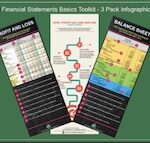Balance Sheet-5 Killer Ratios a Hotel Manager Cannot Ignore
When Was the Last Time You Looked at Your Hotel Balance Sheet?
Did you know that there are immediate, often unpleasant consequences of ignoring a Balance Sheet?
Make no mistake about this.
At its simplest, you may not see a calamity approaching.
You are wondering what I am talking about.
Hang on, I am coming to that shortly.
Before that, are you a victim of this situation?
Grab this EXCEL Spreadsheet
Don’t miss our 5 Killer Hotel KPIs Dashboard
Get this exclusive Excel Template that you can customize to create your own 5 Killer Hotel KPIs Dashboard
Of ignoring the balance sheet I mean.
Well, rest assured that I will make myself clear what I meant.
I will lay out a strong case for elements of the balance sheet every hotel manager must regularly pay attention to.
They literally ensure the long and short term health in terms of the financial position of your hotel business.
This is something your profit and loss statement can never show.
Isn’t that a good reason?
This Chapter 7 of Ultimate Guide on Hotel Balance Sheet Basics covers:
Balance Sheet Vs Profit and Loss Statement
When was the last time as a hotel manager you looked at your Balance Sheet?
Your response may well indicate the importance you attach to it.
Believe me however, your hotel owners have close links to that financial statement.
Just try and remember the millions of dollars they have poured into the hotel project.
Do you have an idea how much that could be?
More specifically, do you know if the financial position of your company is sound?
Many hotel managers think that is not their job.
Your hotel owners may not agree with that!
Whichever way you see it, the truth is this.
If you have restricted yourself to studying the hotel profit and loss statement, you will never get answers to some key questions.
Why not, you ask rather skeptically?
Simple reason!
The Profit and Loss Statement is a performance statement.
It does not tell you anything about the financial position.
More importantly, it just cannot!
For that, you will have to reach for the Balance Sheet.
Look at it this way.
Would you not want to pay attention to something that your owners are forever concerned about?
I do not want to sound like a doomsday merchant.
However, it is worth spending some time with the venerable hotel balance sheet.
It may well make you wiser.
Let us see why and how.
Without further ado, let us dive right in.
Look at the Paradise Hotel Balance Sheet below and identify the 5 killer balance sheet ratios in it.
Net Worth in a Hotel Balance Sheet
Consider this scenario.
As a hotel manager you may have distanced yourself from the balance sheet.
In other words you may not be looking at it.
As a result, you may be focusing on your revenue, expenses and profit.
It is ironical that you are spending time with revenue but not the source of revenue generation.
It is ironical that you are spending time with revenue but not the source of revenue generation.
What do I mean, you ask, feeling offended?
But it is true.
If you focused on just the Profit and Loss Statement, you will know revenue well.
But not something that produces your revenue!
And what is that you ask sarcastically?
Your assets of course.
Quick question.
Do you know the total cost of assets that your hotel business owns?
You cannot know that without consulting the Balance Sheet.
Which brings us to the first key element in the Net Worth ratio.
The Net Worth is the Holy Grail of Long Term Financial Ratios.
Net Worth is literally about how much your business is worth
It is literally about how much your business is worth.
We just saw it’s first key element - total assets.
The second key element is Total Liabilities.
There is value to knowing about your liabilities.
They are moneys you owe others.
You need to pay back those.
Do you know the total cost of liabilities that your hotel business owes?
If you answered “No” to knowing the total cost of assets and liabilities, you do yourself a disservice.
You have ignored the two elements that will tell you whether your business is in good health.
In the long term.
Would you not want to know that?
Particularly if your hotel owner is going to be asking you that!
The Net Worth ratio deducts total liabilities from total assets.
See below:
The higher the ratio the better.
That means that total assets are far higher than total liabilities.
Chances of you paying off your total liabilities with your total assets are that much higher.
As a reminder, total assets are those resources that deliver your revenue in the Profit and Loss Statement.
And now on to the second killer ratio.
Hotel Balance Sheet Working Capital
Have you heard of the expression “blissfully unaware”?
No, I am not being rude!
It is about not being aware of something which is likely to be unpleasant.
It is strange that on the one hand you focus on revenue but not the source - asset.
What about a situation when your revenue is decreasing sharply?
Or your profit.
These are all Profit and Loss Statement related.
You will still not know if this decrease is causing other kinds of problems.
Problems that do not show up on Profit and Loss Statements.
Where do they show up then and what problems, you ask angrily?
In the Balance Sheet (note, I am not the gloating type!).
And the problem could be cash flow related.
The Working Capital Ratio in a balance sheet literally tells you the short term position of cash flow.
See below:
Cash Flow needed to run the day to day business.
You could continue focusing on revenue and even profit but not know about the cash flow.
Working Capital deducts Current Liabilities from Current Assets.
Do you know what are Current Assets?
Current Assets as those which get used up within a financial year.
You will be familiar with types of Current Assets.
But may not know they are Current Assets.
Like Cash, Accounts Receivables, Inventories.
If Net Worth shows you the long term financial position, Working Capital shows you the short term position.
For an opening hotel:
- with no revenue earned yet,
- working capital is what the Owners approve as cash flow
- to run the pre-opening stages.
If you are the general manager of a managed hotel, your Hotel Management Agreement will lay out the Working Capital specifically.
You will see a pattern in all the five Balance Sheet Ratios we will be discussing.
That we know about the effect but not the cause (which is more important!).
I will make myself clear going forward in this post.
And now to a ratio which we touched upon peripherally when discussing Net Worth.
Fixed Assets Turnover Ratio
In discussing Net Worth earlier, we talked about Total Assets.
We also said that the hotel Profit and Loss Statement can only talk about revenue.
It cannot talk about the assets that produce the revenue.
But It is not enough to stop there.
What if you needed to know what is the potential of the assets to produce revenue?
Aha, we are gaining some ground.
What if we married the Profit and Loss Statement and the Balance Sheet?
Uh What, you sputter in outrage?
Hang on, let me explain.
What I meant is: what if we linked up the revenue to the source, the assets?
Voila!
The Fixed Assets Turnover Ratio does just that!
Turnover refers to revenue in the context of a hotel.
Fixed Assets are the long term assets (the benefit of which extends beyond a financial year).
So, this ratio tells you how many dollars your hotel is earning for every dollar cost of fixed assets owned.
A powerful ratio indeed.
See below:
It literally shows you the productivity of your fixed assets.
See now why it is great to know about the Balance Sheet.
That is not just an accountant’s pitch!
And now, let us extend our discussion of productivity of assets.
Let us learn about the last two ratios in this blog post.
Inventory Turnover in a Hotel Balance Sheet
We will now turn our attention to two asset categories which are common in any hotel situation.
The first of the two current assets are inventories.
Inventories are familiar to you.
You plan to buy them, buy them, store them and then issue to the operation.
Did you know that you did all that and still have that same blissfully unaware situation all over again.
What, you ask angrily?
How would you know if your inventory management is efficient?
How would you know if your inventory management is efficient?
I do confirm here that this is something that most hotel managers might be looking at.
Even without reading a Balance Sheet!
Just with a schedule as part of the monthly profit and loss statement.
However, still that will not provide information on something critical.
Let us first see what this ratio is all about.
The Inventory Turnover Ratio literally tells you how many times your inventories turned over.
That means, how many times sold or consumed in the operation.
It is the productivity measure for inventory management.
See below:
Believe me, you do not want a low inventory turnover ratio.
It requires more storage, is susceptible to loss or pilferage.
And it locks up precious cash flow.
That last one you will not know if you are looking only at the Profit and Loss Statement!
A high price to pay indeed!
And now victoriously on to the last of the productivity ratios.
This is one which is linked to your revenue.
Aha, that earned your attention!
Hotel Balance Sheet Accounts Receivable Turnover
You may be throwing the kitchen sink at generating revenue.
But are you ensuring this translates to money in the bank?
This last but by no means least of the killer balance sheet ratios is about the efficiency with which your accounts receivables turn over.
In other words, how quickly revenue translates to cash inflow!
Normally, hotels tend to pursue accounts receivables better than many other assets.
More possibly because owners are also switched on about collecting receivables fast.
The Accounts Receivable Turnover Ratio compares average accounts receivables with Net Credit Sales.
See below:
Why credit sales?
Basically because cash sales have accomplished the money in bank simultaneously with the sales.
It is only the credit sales, or billed / invoiced revenue that needs to be collected.
When accounts receivables fail to be collected beyond six months, there is danger that they might go bad.
In other words, remain uncollected.
And will need to be written off.
A write off is a loss to the hotel.
And a failure of the collection effort.
Not to mention the revenue cycle remaining incomplete (no money in bank!)
Believe me, you do not want to be the general manager to tell the owner about a debt gone bad! Ouch!
So, there you go!
5 Killer Balance Sheet Ratios hotel managers cannot ignore.
Your Key Takeaways
Over to you.
Do you look at your hotel balance sheet at all?
How do you keep track of the 5 killer balance sheet ratios?
Do you still think focusing on just the Profit and Loss Statement is enough?
What is your plan to begin paying attention the Balance Sheet?
I am keen on knowing your thoughts on this.
Leave your comments below.
Other Chapters of Ultimate Guide on Hotel Balance Sheet Basics
Sign Up for More Tips, Strategies and Secrets
Sign up to the Financial Skills Building Newsletter for more tips, strategies and secrets straight to your inbox.
17











